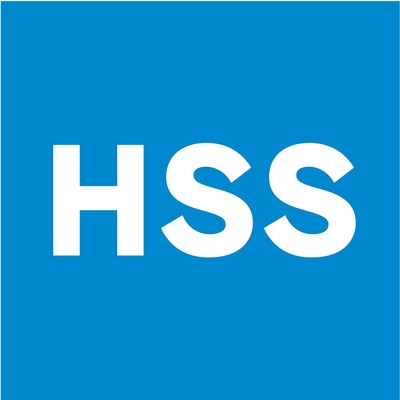WASHINGTON, Nov. 16, 2024 /PRNewswire/ — Investigators from HSS and collaborating centers identified distinct immune cell patterns in blood that signal an increased risk of developing rheumatoid arthritis (RA) before symptoms occur. The discovery represents a key milestone in creating a blood test that could help doctors identify patients at higher risk of the disease.
The study, presented today at the annual meeting of the American College of Rheumatology, ACR Convergence 2024, was led by researchers at the University of Colorado School of Medicine in collaboration with investigators from HSS and other centers within the Accelerating Medicines Partnership® Program: Rheumatoid Arthritis and Systemic Lupus Erythematosus (AMP® RA/SLE) Network.1
“These research findings validate the importance of certain immune cells in the development of RA, particularly in how they drive the change from asymptomatic to symptomatic,” said Laura Donlin, PhD, scientist and co-director of the HSS Precision Medicine Program and co-principal investigator of the National Institutes of Health-supported AMP Rheumatoid Arthritis research consortium. “We hope that one day we can use these insights to stop RA before it even begins.”
Rheumatoid arthritis is a type of inflammatory arthritis that can occur when specific types of immune cells attack the body’s healthy tissues, resulting in pain, swelling and stiffness in joints. It can also result in problems in other areas of the body, such as the heart, lungs, eyes, nerves and skin. Diagnosis typically relies on an evaluation by a rheumatologist for clinical signs and symptoms supported by further evidence from X-rays and blood tests.
For the study, the participating rheumatologists collected tissue and blood samples from patients who either had RA or were considered at risk due to specific antibodies, called ACPA, in their blood and having a first-degree relative with the disease. Researchers at the Broad Institute of MIT and Harvard then used advanced single-cell sequencing techniques to analyze the samples and compared the results to those from healthy individuals.
The analysis found higher numbers of certain immune cells in the patients at risk for RA, including CCR2+ T helper cells, T peripheral helper cells, type 1 T helper cells, and granzyme B-positive memory T helper cells. Advanced sequencing also gave the investigators a better understanding of which genes were activated in these cells, offering insight into how the immune cells in patients with RA differ from those in at-risk individuals and healthy people.
“We knew that the presence of ACPA in blood and having a first-degree relative with rheumatoid arthritis indicate risk, but this new research has allowed us to learn more about the underlying biology driving increased risk,” said HSS rheumatologist Susan M. Goodman, MD, a co-author of the study. “These insights will pave the way toward helping us develop a new tool for determining which patients may benefit from early intervention.”
“There is some evidence that existing RA drugs, such as abatacept or rituximab, may help prevent the disease, but they are relatively expensive and come with side effects,” said co-author S. Louis Bridges, Jr., MD, PhD, physician-in-chief and chief of the Division of Rheumatology at HSS. “Pending validation in larger studies, the new patterns of immune cells identified in this research could represent potential targets for the development of new, more effective therapies.”
HSS Authors: S. Louis Bridges, Jr., MD, PhD, Vivian P. Bykerk, BSc, MD, FRCPC, Susan M. Goodman, MD, Laura Donlin, PhD.
Reference:
1 Inamo J, Keegan J, Griffith A, Ghosh T, Horisberger A, Howard K, Pulford J, Murzin E, Hancock B, Eisenhaure T, Dominguez S, Gurra M, Gurajala S, Jonsson A, Seifert J, Feser M, Norris J, Cao Y, Apruzzese W, Bridges S, Bykerk V, Goodman S, Donlin L, Firestein G, Bathon J, Hughes L, Tabechian D, Filer A, Pitzalis C, Anolik J, Moreland L, Hacohen N, Guthridge J, James J, Cuda C, Perlman H, Brenner M, Raychaudhuri S, Sparks J, Holers M, Deane K, Lederer J, Rao D, Zhang F. Deciphering Pathogenic Phenotypes by Multi-modal Deep Single-cell Blood Immunophenotyping in Individuals At-risk for Rheumatoid Arthritis [abstract]. Arthritis Rheumatol. 2024; 76 (suppl 9). https://acrabstracts.org/abstract/deciphering-pathogenic-phenotypes-by-multi-modal-deep-single-cell-blood-immunophenotyping-in-individuals-at-risk-for-rheumatoid-arthritis/. Accessed October 10, 2024.
About HSS
HSS is the world’s leading academic medical center focused on musculoskeletal health. At its core is Hospital for Special Surgery, nationally ranked No. 1 in orthopedics (for the 15th consecutive year), No. 3 in rheumatology by U.S. News & World Report (2024-2025), and the best pediatric orthopedic hospital in NY, NJ and CT by U.S. News & World Report “Best Children’s Hospitals” list (2024-2025). In a survey of medical professionals in more than 20 countries by Newsweek, HSS is ranked world #1 in orthopedics for a fifth consecutive year (2025). Founded in 1863, the Hospital has the lowest readmission rates in the nation for orthopedics, and among the lowest infection and complication rates. HSS was the first in New York State to receive Magnet Recognition for Excellence in Nursing Service from the American Nurses Credentialing Center five consecutive times. An affiliate of Weill Cornell Medical College, HSS has a main campus in New York City and facilities in New Jersey, Connecticut and in the Long Island and Westchester County regions of New York State, as well as in Florida. In addition to patient care, HSS leads the field in research, innovation and education. The HSS Research Institute comprises 20 laboratories and 300 staff members focused on leading the advancement of musculoskeletal health through prevention of degeneration, tissue repair and tissue regeneration. In addition, more than 200 HSS clinical investigators are working to improve patient outcomes through better ways to prevent, diagnose, and treat orthopedic, rheumatic and musculoskeletal diseases. The HSS Innovation Institute works to realize the potential of new drugs, therapeutics and devices. The HSS Education Institute is a trusted leader in advancing musculoskeletal knowledge and research for physicians, nurses, allied health professionals, academic trainees, and consumers in more than 165 countries. The institution is collaborating with medical centers and other organizations to advance the quality and value of musculoskeletal care and to make world-class HSS care more widely accessible nationally and internationally. www.hss.edu.
![]() View original content to download multimedia:https://www.prnewswire.com/news-releases/new-research-reveals-alterations-in-blood-of-people-at-risk-of-developing-rheumatoid-arthritis-302307372.html
View original content to download multimedia:https://www.prnewswire.com/news-releases/new-research-reveals-alterations-in-blood-of-people-at-risk-of-developing-rheumatoid-arthritis-302307372.html
SOURCE Hospital for Special Surgery

Featured Image: Megapixl @ Marilyna




